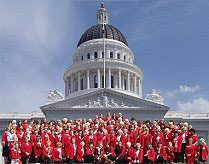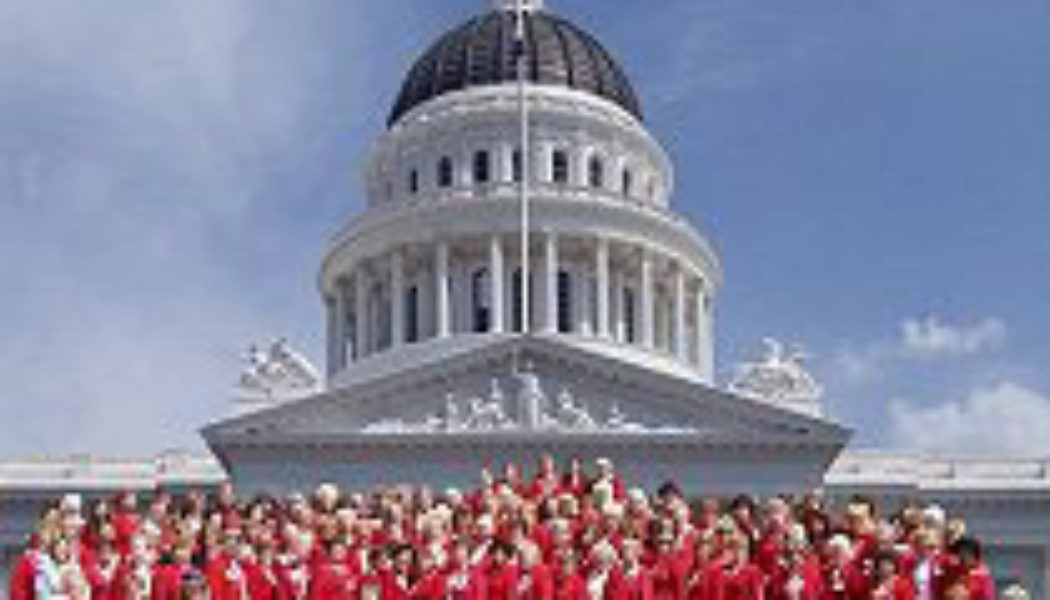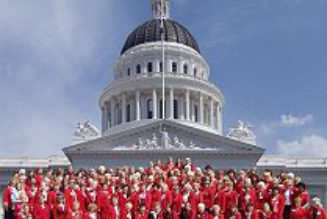
Allison Olson, CFRW Advocate
Capitol Update
Tuesday, February 25, 2020
California Federation of Republican Women
Sue Blair, President
Time To Vote!
The March 3rd Primary Election is just one week away! If you have not returned your ballot yet, please do and remind everyone you know in California to do the same! If you live in one of the very few counties not complying with the new total vote by mail law, then you’ll be voting in just one week. Most voters in this state have not returned their ballots yet. There is still time to educate voters!
In the past several Capitol Updates we issued our official position on the Primary Ballot’s Prop 13. The CFRW Voting Body recommends NO on Prop 13! This $15 billion school facilities bond is being touted as necessary for the building, maintaining, repairing and retrofitting of our California public schools. What the Democrats won’t tell you is that this bond comes with $11 billion in interest paid, putting the price tag up to $26 billion over 35 years. They also won’t remind voters that the state of California already has $7.8 billion in unallocated and unused school facilities bond money just sitting there.
Over the past 20 years, California voters have approved 5 school facilities bond measures, totaling over $45 billion for school construction, maintenance, repairs and retrofits. And over those 20 years, what do we have to show for it? Clearly the equation isn’t working. California voters need to send a message to Sacramento to be better stewards with OUR money!
Speaking of stewardship of taxpayer dollars, there are two other problems that stand out buried in the language of Prop 13. One being the favoritism shown for contractors with Project Labor Agreements, or PLAs. These union contractors are given funding priorities by the school districts using Prop 13 funding, if passed. Collective bargaining bids are often, if not always, higher and more costly than non-union companies. But Prop 13 would allow school districts to favor these bids, which would be an inefficient use of taxpayer money!
The second glaring issue within Prop 13 is changing the current law to allow school districts the ability to borrow almost double the amount they are permitted to from the state. The increase in school district debt allowance will increase YOUR property taxes. School districts that borrow funds from the state must pay the state back with local property taxes. This is called “Voted Indebtedness” and it’s on your property tax bill. So yes, this Prop 13 could actually RAISE your property taxes!
The CFRW has issued opposition rationale as well as talking points for NO on Prop 13. CLICK HERE for the opposition rationale and CLICK HERE for the talking points. As stated earlier, there is still time to educate voters on the pitfalls of the Primary Election Ballot’s Prop 13.
State Lottery Corruption
At the request of Senator Ling-Ling Chang (R, Diamond Bar), the California State Lottery was audited and the State Auditor’s office found what Senator Chang suspected – the State Lottery was not sending enough of it’s revenue to California public schools. Since 2010 the state lottery’s revenue more than doubled, from $3 billion to $7 billion annually. Since that time, the amount that the state lottery sends to our public school fund has only increased from $1 billion to schools a decade ago to $1.7 billion to schools in 2017-2018. But yearly revenue increased by more than double! So where’s the discrepancy? The State Auditor found that the State Lottery’s spending practices more than suspect. In just one instance, at a trade show in 2014, lottery officials paid $60 for a dozen granola bars. Time and Time again we see this level of corruption in our state government. The State Auditor found the CA Lottery owes at least $36 million to schools. Senator Chang stated, “the California lottery has a culture of profits first and schools last. They owe our schools millions of dollars and I will be introducing legislation to ensure our schools get what they are owed”. CLICK HERE to read the Sac Bee Article.
YES on AB 1928
On Thursday, February 27th, Assemblyman Kiley (R, Roseville) will ask the Assembly Floor to vote on his bill, AB 1928, which would halt the implementation of AB 5 (Gonzalez, D) until the legislature can improve it. As with many bills passed by this Democrat controlled legislature, the unintended consequences have left approximately 1 million gig workers in California in limbo, with no clear path forward. There are over 30 bills in the legislature that address problems with AB 5- some attending to minor tweaks and others with a complete “repeal and replace”. Call your Assembly member and ask them to VOTE YES on AB 1928 to suspend implementation of AB 5 until something better can be put in its place!
Looking Forward
The ballot is already taking shape for the November General Election. There are 4 qualified ballot measures so far, but the total number could be as many as 12 or more. Proponents of the Split Roll Tax (original Prop 13 attack) are working to qualify another measure that would replace the existing Split Roll measure already qualified for the General Election Ballot. Signatures are needed to be certified 131 days before the general election, so the deadline is quickly approaching! The hard and fast deadline by the California Secretary of State for initiated constitutional amendments is June 25th, but since the process of verifying signatures can take mulitple months, the recommended deadlines are March 3rd for an initiative that requires a full signature check and April 21st for an initiative that only requires a random sampling of signatures. So what does this mean? By July we will know which measures made the cut, and by August we will have the propositions numbered and in their order as they will appear on the ballot. Keep in mind this does not include legislatively referred measures. Those require a 2/3rds vote in each house for constitutional amendments, and no governor’s signature is necessary. For state statutes and bonds referred to the ballot by the legislature, a simple majority and the governor’s signature is required.


